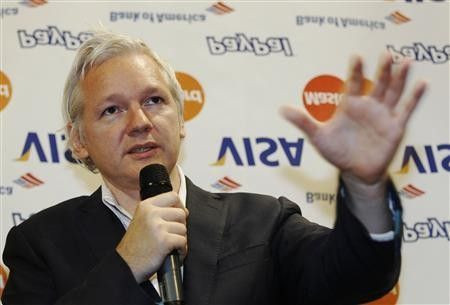‘Financial Blockade’ Forces Wikileaks to Suspend Releasing Secret Files

Wikileaks, a whistle-blowing Web site known for releasing secret government files, on Monday said it is suspending its publication in order to seek funding to sustain its work.
Wikileaks has been forced to shift focus toward fundraising because 95 percent of its revenue has been destroyed.
Wikileaks founder Julian Assange has told the media that this is because of an arbitrary and unlawful financial blockade placed on Bank of America, Visa, MasterCard, PayPal and Western Union last December.
Our scarce resources now must focus entirely on fighting this unlawful banking blockade, Assange told CNN. If this financial attack stands unchallenged, a dangerous, oppressive and undemocratic precedent will have been set, the implications of which go far beyond WikiLeaks and its work.
The organization has managed to stay afloat for the last 11 months because of its cash reserves, Assange added.
Assange's announcement of the suspension came after Wikileaks disclosed hundreds of thousands of secret U.S. government files and diplomatic cables on the Internet.
CNN reported that many financial institutions have stopped doing business with the Wikileaks after the confidential U.S. diplomatic cables were released late last year. Donations to the site also took a hit.
Assange said his organization lost tens of millions of dollars in lost donations at a time of unprecedented operational costs. He also told the BBC that a handful of U.S. finance companies cannot be allowed to decide how the whole world votes with its pocket.
[Wikileaks must] aggressively fundraise in order to fight back against this blockade and its proponent, Assange told the BBC.
Back in September, CNN reported on Wikileaks' controversial decision to release the documents. The organization's actions were condemn by its media partners such as The Guardian, The New York Times, Der Spiegel and El Pais who believed disclosing this type of information posed risks to individuals and national security.
We deplore the decision of WikiLeaks to publish the unredacted State Department cables, which may put sources at risk, the media companies said in a joint statement reported by CNN. Our previous dealings with WikiLeaks were on the clear basis that we would only publish cables which had been subjected to a thorough editing and clearance process.
We will continue to defend our collaborative publishing endeavour. We cannot defend the needless publication of the complete data -- indeed, we are united in condemning it. Today's decision to publish by Julian Assange was his, and his alone.
Also in September, U.S. State Department spokesman Victoria Nuland told CNN that WikiLeaks ignored the department's requests not to release or disseminate any U.S. documents it may possess and has continued its well-established pattern of irresponsible, reckless, and frankly dangerous actions.
But on Monday, Assange argued that WikiLeaks' publications are protected by the First Amendment of the U.S. Constitution. He also told CNN that there were no judgments or charges against his organization.
However, Assange said his organization is taking pre-litigation action against the blockade in Iceland, Denmark, the UK, Brussels, U.S. and Australia. An anti-trust complaint has also been launched at the European Commission, Wikileaks told the media.
Kristinn Hrafnsson, spokesman for Wikileaks, told the BBC that its website would reopen for submissions of confidential documents on Nov. 28.
© Copyright IBTimes 2025. All rights reserved.






















